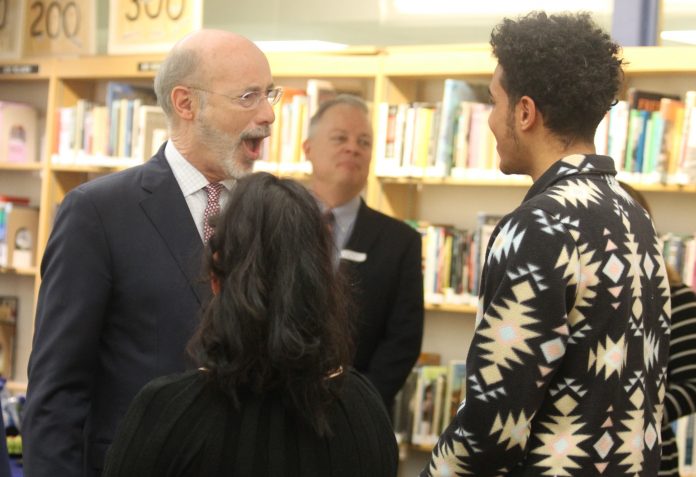Gov. Tom Wolf wants to make a deal with soon-to-be high school graduates.
If they attend college at one of the 14 state schools in Pennsylvania, they’ll come out on the other side with not only a degree, but less debt. The only catch? Students must live in the state after graduation for the same number of years they receive funding from Wolf’s proposed Nellie Bly Scholarship Program. If they leave the state early, they must repay the money.
Last Wednesday morning, Wolf graced the library at Fairless Hills’ Pennsbury High School West, where an intimate group of students, parents, faculty and local elected officials convened to learn about the initiative and share their thoughts with the governor.
The Nellie Bly Scholarship Program, unveiled during Wolf’s budget address, would be funded annually by repurposing $200 million from the current $250 million Horse Racing Development Fund. It would close the gap after a student’s Pell Grant and other state grants to cover tuition and fees at Pennsylvania State System of Higher Education universities, allowing more students to graduate on time with less student loan debt.
“Let’s bet on our kids rather than the horses,” Wolf said. “The student debt crisis is a burden on young people and their families that can last for years. It holds young people back from finishing their degree, buying a car or a home and saving for retirement. The Nellie Bly Scholarship is an investment in young people so they can graduate, stay in Pennsylvania and build rewarding careers and live here.”
The program was named in memory of Nellie Bly, an Armstrong County native born in 1864 who attended the Indiana Normal School (now Indiana University of Pennsylvania), but moved to New York due to the high cost. Bly became a pioneering journalist who helped to force reforms to the mental health care system in the early 20th century.
“I think about what a waste that was for Pennsylvania,” Wolf said of Bly’s relocation. “If we have a system that forces you to go out of state to get a job to pay off your college debt, we’re the losers.”
If implemented, according to Wolf, the program would cover the full tuition of 26,000 students each year. For most students at a state college, he said the average debt is at least $37,000. This equates to a monthly loan payment of $397 for 10 years. As a whole, student loan debt for Pennsylvania residents is $68 billion – among the highest in the nation.

All parents in attendance were in support of the scholarship program, especially Kenya Blackstone, mother of student Raizel Stebbins. Blackstone, who is still paying off her debt from Bucks County Community College, Cairn University and Temple University, understands the struggle firsthand.
“That will always be my black cloud. I already know that’s going to be there, but I don’t want that for her. I don’t want her to go into adulthood with a looming college debt,” she said.
Blackstone and Stacey Rogers, mother of Malik Thomas, agreed that they wouldn’t hold their child back if they wanted to experience school out of state. But if the Nellie Bly Scholarship Program became a reality, all parties said they would seriously reconsider.
State Reps. Tina Davis, Perry Warren and John Galloway voiced their approval.
“Me having three kids with this debt, it’s very difficult for us. We haven’t figured it out yet, how we’re going to refinance,” Davis said. “If we had a program like this when they were in school, I still have one at Temple, that would’ve been awesome.”
Warren, who recently witnessed ninth- and 10th-graders at a career fair looking for jobs in order to start saving for school, said the program would allow them to focus more on their studies. Like Davis, he is dealing with the crushing debt of his five kids’ education.
“There is just a dramatic difference in the cost of college. It has gone up by at least $1,000 every year,” he said. “All my kids went out of state, and a program like this may have kept them here in Pennsylvania.”
Galloway, a ‘77 Pennsbury alumni, praised Wolf for his efforts.
“Somebody took the lead. Somebody said, ‘We’ve got to do something about it.’ That person, of course, takes all the hits, and that was the governor. He came up with a holistic approach, in other words, top to bottom. It’s paid for,” he said. “You’ve got to find different ways. This is a program that deals with student loan debt. It incentivizes kids to stay in Pennsylvania. It incentivizes them to attend our great schools of higher education.”
In addition to the scholarship program, the governor’s budget provides a $435 million increase for Pre-K to 12 education, including $100 million more for public schools using the fair funding formula, $25 million more for special education and $30 million more for high-quality early childhood education. The budget also saves school districts $280 million through comprehensive Charter School Law reform.
Samantha Bambino can be reached at [email protected]


